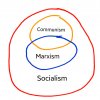TheNZThrower
Active Member
Hi! This tweet alleges that MLK was a so called "racial-marxist" who opposed meritocracy. He also included a clip from a broader MLK speech to support his allegations:
The clip which was quoted from, in the context of the tweet, was meant to imply that MLK supported redistributing economic wealth and power along explicitly race-based lines, presumably disproportionately to blacks over whites. At least this is my best interpretation as this is most likely an attempt at using an out of context statement to stir up vague red-scare esque fears. One simple way to check these allegations and insinuations is to ask:
The clip which was quoted from, in the context of the tweet, was meant to imply that MLK supported redistributing economic wealth and power along explicitly race-based lines, presumably disproportionately to blacks over whites. At least this is my best interpretation as this is most likely an attempt at using an out of context statement to stir up vague red-scare esque fears. One simple way to check these allegations and insinuations is to ask:
- What issues was King referring to?
- How is he proposing to “redistribute” economic power?
- Who is he “redistributing” economic power from/to?
- What are the billions of dollars going to be spent on?

